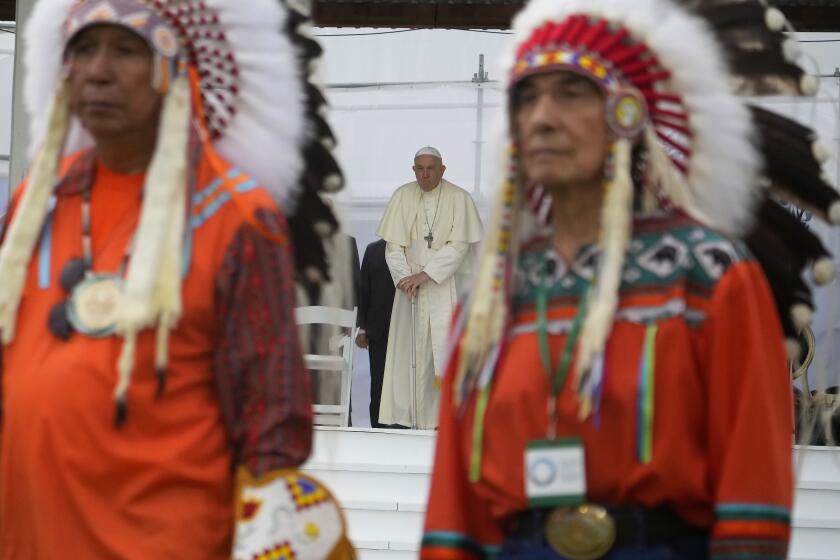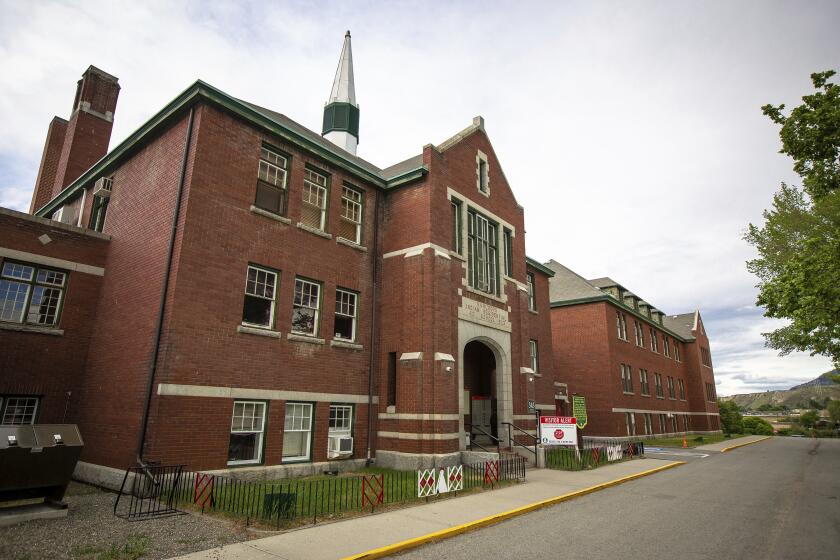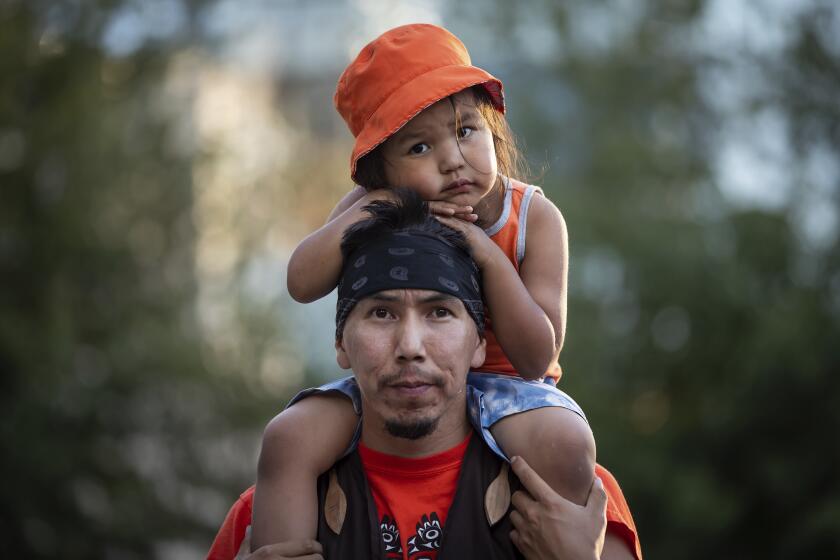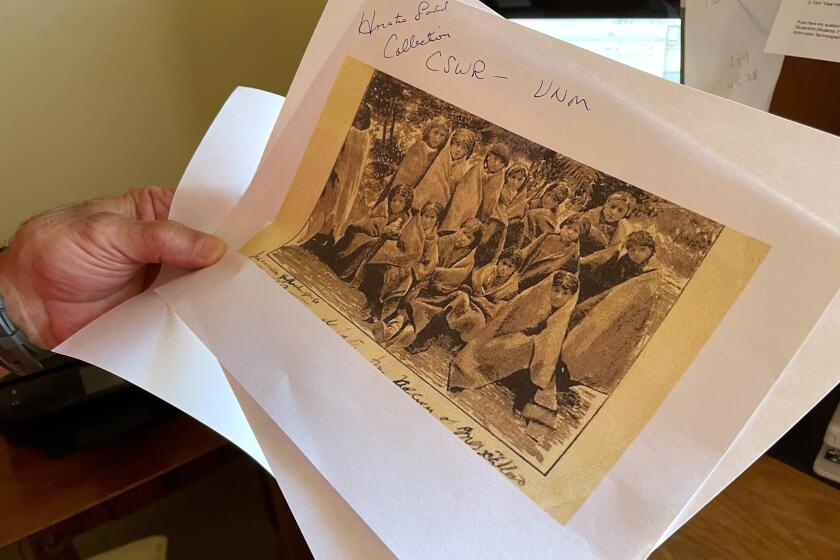Pope apologizes for ‘catastrophic’ school policy in Canada
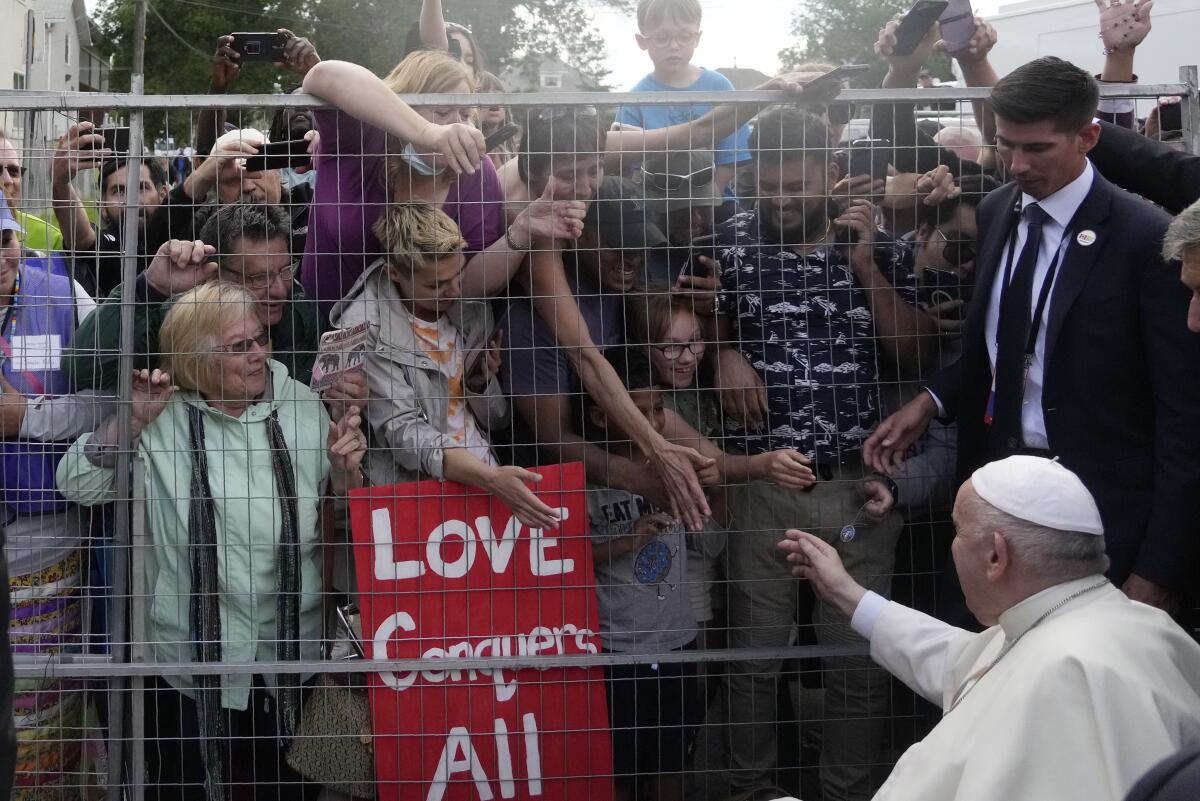
- Share via
MASKWACIS, Canada — Pope Francis issued a historic apology Monday for the Catholic Church’s cooperation with Canada’s “catastrophic” policy of Indigenous residential schools, saying the forced assimilation of Native peoples into Christian society destroyed their cultures, severed families and marginalized generations.
“I am deeply sorry,” Francis said to applause from school survivors and Indigenous community members gathered at a former residential school south of Edmonton, Alberta. He called the school policy a “disastrous error” that was incompatible with the Gospel and said further investigation and healing are needed.
“I humbly beg forgiveness for the evil committed by so many Christians against the Indigenous peoples,” Francis said.
In the first event of his weeklong “penitential pilgrimage,” Francis traveled to the lands of four Cree nations to pray at a cemetery and then deliver the long-sought apology at nearby powwow ceremonial grounds. Four chiefs escorted the pontiff in a wheelchair to the site near the former Ermineskin Indian Residential School, and presented him with a feathered headdress after he spoke, making him an honorary leader of the community.
Francis’ words went beyond his earlier apology for the “deplorable” abuses committed by missionaries and instead took institutional responsibility for the church’s cooperation with Canada’s “catastrophic” assimilation policy, which the country’s Truth and Reconciliation Commission said amounted to a “cultural genocide.”
Pope Francis apologizes for the Catholic Church’s role in Canada’s policy of forced assimilation of Native peoples.
More than 150,000 native children in Canada were forced to attend government-funded Christian schools from the 19th century until the 1970s in an effort to isolate them from the influence of their homes and culture. The aim was to Christianize and assimilate them into mainstream society, which previous Canadian governments considered superior.
Ottawa has admitted that physical and sexual abuse was rampant at the schools, with students beaten for speaking their Native languages. That legacy of that abuse and isolation from family has been cited by Indigenous leaders as a root cause of the epidemic rates of alcohol and drug addiction now on Canadian reservations.
The discoveries of hundreds of potential burial sites at former schools in the last year drew international attention to the schools in Canada and their counterparts in the United States. The revelations prompted Francis to comply with the truth commission’s call for an apology on Canadian soil; Catholic religious orders operated 66 of the country’s 139 residential schools.
The remains of 215 children, some as young as 3, have been found buried on the site of what was once Canada’s largest Indigenous residential school.
Reflecting the conflicting emotions of the day, some in the crowd wept as Francis spoke, while others applauded or stayed silent listening to his words, delivered in his native Spanish with English translations. Others chose to not attend at all.
“I’ve waited 50 years for this apology, and finally today I heard it,” survivor Evelyn Korkmaz said. “Part of me is rejoiced, part of me is sad, part of me is numb.” She added, however, that she had hoped to hear a “work plan” from the pope on what he would do next to reconcile, including releasing church files on children who died at the schools.
Many in the crowd wore traditional dress, including colorful ribbon skirts and vests with Native motifs. Others donned orange shirts, which have become a symbol of school survivors, recalling the story of one woman whose beloved orange shirt, a gift from her grandmother, was confiscated at a school and replaced with a uniform.
Hundreds of unmarked graves are found at the site of a former residential school for Indigenous children in Canada, Indigenous leaders say.
“It’s something that is needed, not only for people to hear but for the church to be accountable,” said Sandi Harper, who traveled with her sister and a church group from Saskatchewan in honor of their late mother, who attended a residential school.
“He recognizes this road to reconciliation is going to take time, but he is really on board with us,” she said, calling the apology “genuine.”
Despite the solemnity of the event, the atmosphere seemed at times joyful: A procession of chiefs arrived at the venue to a hypnotic drumbeat, elders danced and the crowd cheered and chanted war songs, victory songs and finally a healing song. Participants paraded a long red banner through the grounds bearing the names of more than 4,000 children who died at or never came home from residential schools; Francis later kissed it.
“I wasn’t disappointed. It was quite a momentous occasion,” said Phil Fontaine, a residential school survivor and former chief of the Assembly of First Nations who went public in the 1990s with his story of sexual abuse.
Prime Minister Justin Trudeau, who last year apologized for the “incredibly harmful government policy,” also attended, along with other officials.
As part of a lawsuit settlement involving the government, churches and about 90,000 survivors, Canada paid reparations that amounted to billions of dollars being transferred to Indigenous communities. Canada’s Catholic Church says its dioceses and religious orders have provided more than $50 million in cash and in-kind contributions and hope to add $30 million more over the next five years.
Although the pope acknowledged blame, he also made it clear that Catholic missionaries were merely cooperating with and implementing the government policy, which he termed the “colonizing mentality of the powers.” Notably he didn’t refer to 15th century papal decrees that provided religious backing to European colonial powers in the first place.
Jeremy Bergen, a church apology expert and professor of religious and theological studies at Conrad Grebel University College in Waterloo, Ontario, said Francis made it clear he was asking forgiveness for the actions of “members of the church” but not the institution in its entirety.
“The idea is that, as the Body of Christ, the church itself is sinless,” he said via email.
“So when Catholics do bad things, they are not truly acting on behalf of the church,” Bergen added, noting it’s a controversial idea on which many Catholic theologians disagree.
Francis said the schools marginalized generations, suppressed Indigenous languages, led to physical, verbal, psychological and spiritual abuse and “indelibly affected relationships between parents and children, grandparents and grandchildren.” He called for further investigation, a possible reference to demands for further access to church records and personnel files of priests and nuns to identify perpetrators of abuses.
The report released by the Interior Department expands the number of schools that were known to have operated for 150 years, starting in the early 19th century.
“Although Christian charity was not absent, and there were many outstanding instances of devotion and care for children, the overall effects of the policies linked to the residential schools were catastrophic,” Francis said. “What our Christian faith tells us is that this was a disastrous error, incompatible with the Gospel of Jesus Christ.”
The first pope from the Americas was determined to make this trip, even though torn knee ligaments forced him to cancel a visit to Africa this month.
The six-day visit — which includes stops in Quebec City and Iqaluit, Nunavut, in the far north — follows meetings Francis held in the spring at the Vatican with First Nations, Metis and Inuit delegations. Those encounters culminated with Francis’ apology April 1 for “deplorable” abuses at residential schools and a promise to do so again on Canadian soil.
Francis recalled that one of the delegations gave him a set of beaded moccasins as a symbol of children who never came back from the schools, and asked him to return them in Canada. Francis said that in these months they “kept alive my sense of sorrow, indignation and shame” but that in returning them he hoped they can also represent a path to walk together.
Event organizers had mental health counselors on hand Monday, knowing the event could be traumatic for some people.
Later Monday, Francis visited Sacred Heart Church of the First Peoples, an Edmonton parish whose sanctuary was dedicated last week after being restored from a fire. The church incorporates Indigenous language and customs in liturgy, and both were on display during the event, with folk songs and drums and providing the backdrop to the pope’s visit.
More to Read
Sign up for Essential California
The most important California stories and recommendations in your inbox every morning.
You may occasionally receive promotional content from the Los Angeles Times.
